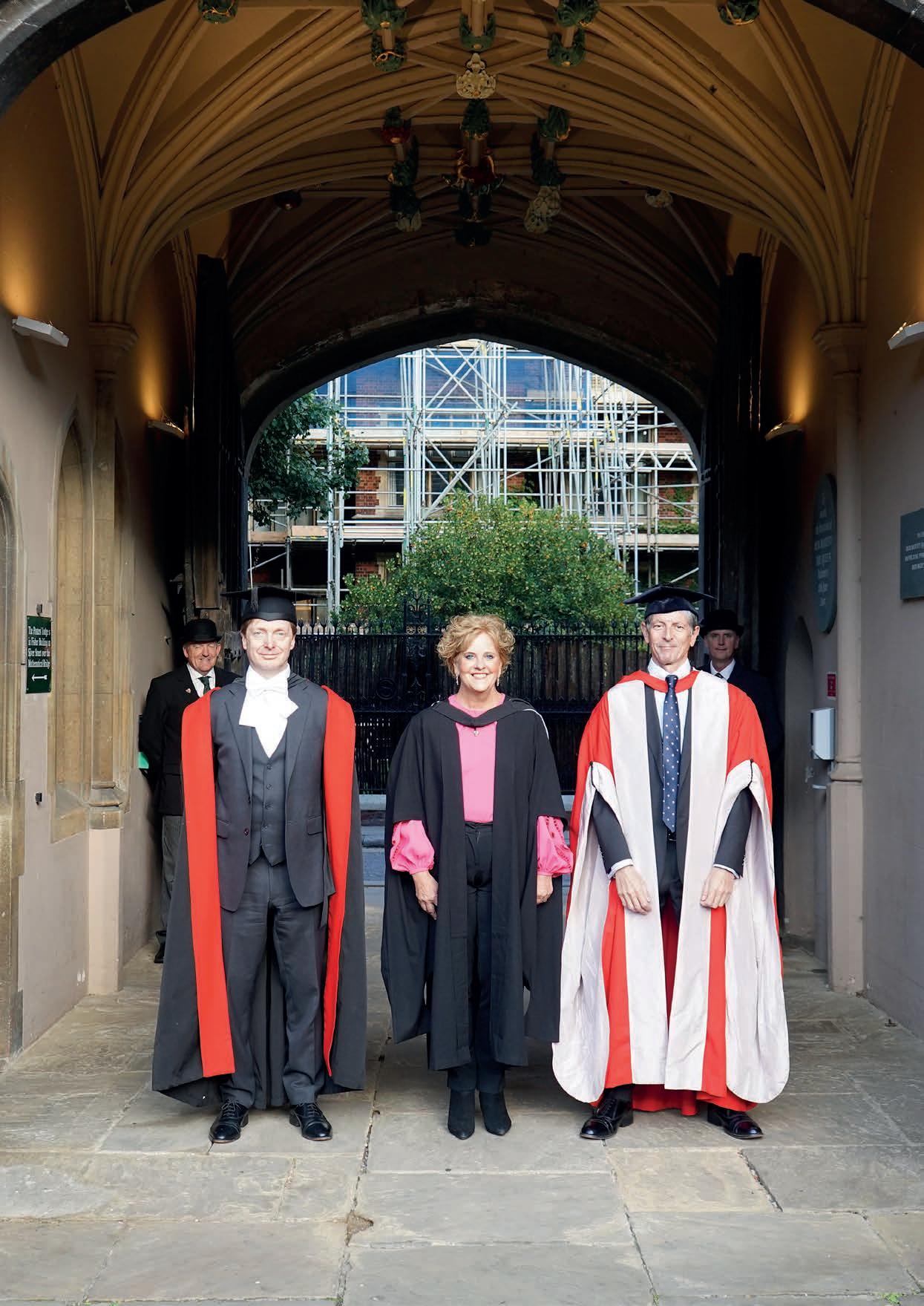
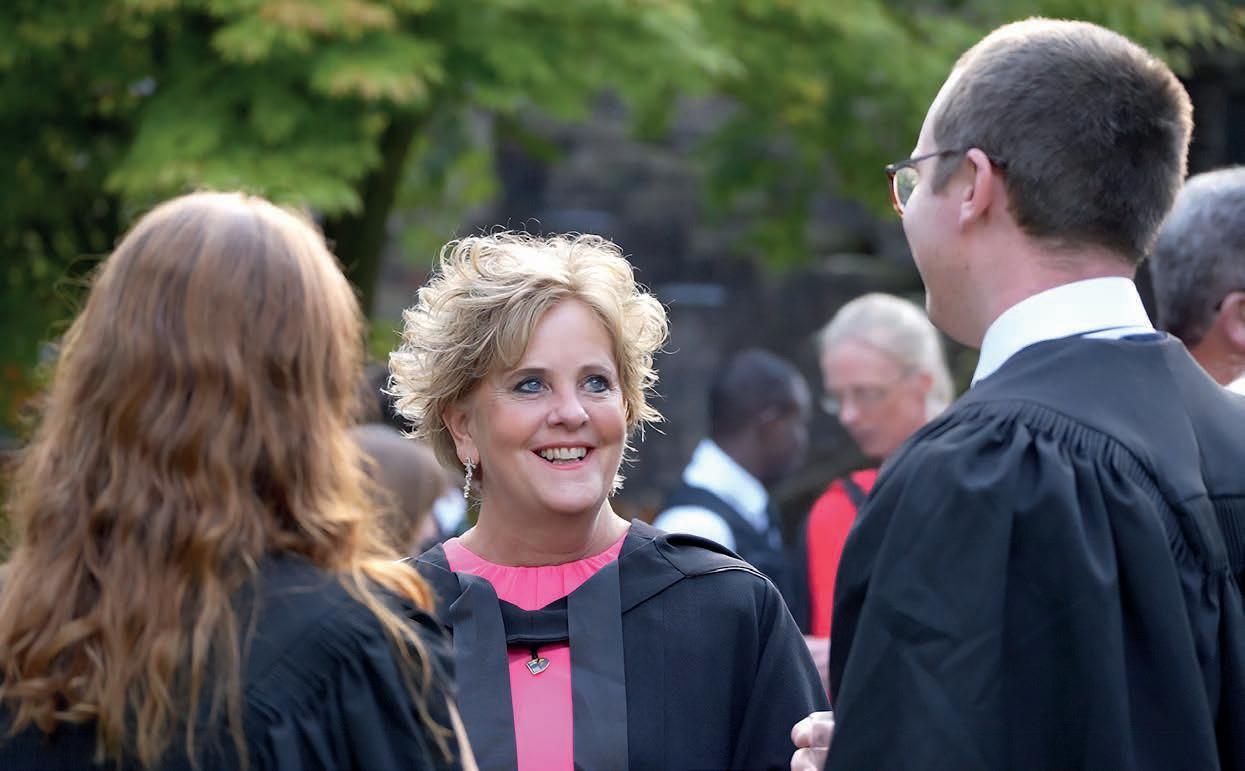



When Dame Menna Rawlings first walked through the gates of Queens’, she felt an immediate connection. “It was love at first sight,” she says with a smile. “I walked through the Porters’ Lodge, it was a beautiful day, and I was completely wowed by Queens’.”
After a 36-year career in diplomacy, culminating in her previous role as Ambassador to France and the Principality of Monaco, she has returned to the UK and stepped into the role of President of Queens’. In her first few weeks in post, she reflects on diplomacy, community, and what excites her most about leading the College into its next chapter.
What attracted you to Queens’ and the role of President?
I saw this opportunity at a time when I was starting to think about what I might do next. I already knew I was looking for something new and different: after 36 years in diplomacy and four intense years in Paris, it was time for a change. I felt ready to come back to the UK, and the university sector speaks to my passion for lifelong learning and higher education. I am also acutely conscious of the importance
of universities to Britain’s reputation and ‘soft power’ overseas. Queens’ appealed to me immediately. The first thing I read about the College was that it’s a true all-rounder; strong in science, engineering, and maths, but also with a real emphasis on the arts and humanities. It’s a place that excels academically while also focusing on the growth of the whole person. I was also drawn to its openness and inclusion, and to the great work Queens’ has done on widening access and participation. Coming from an ordinary background myself, that resonated.
How have you found your first few weeks in post?
It’s still all very new, and I approach this with real humility because there’s so much to learn. But what I’ve loved is how many people are here to help and advise. Everyone has been incredibly supportive, from the Fellows and the academic community to the students and staff.
The installation ceremony was so special, and I’m grateful to everyone who helped make it such an open and inclusive event, including not just the Fellowship but the staff, students, and my family – my husband Mark and our three kids. I will never forget it.
What would you like to achieve during your tenure at Queens’?
I’m very conscious of listening and learning before setting any big priorities. Broadly speaking, I’d say I’m here to steward the College through the next few years against a tough context in the UK and overseas, and to nurture our resilience, particularly in two areas.
One is financial resilience. With the building project underway at Owlstone Croft, it’s important that we have the right financial foundations to continue investing in the College’s future. The other is community
resilience, ensuring Queens’ remains a place where everyone can thrive and achieve their academic potential. That includes continuing to strengthen our work on sustainability and accessibility, and retaining space for open and respectful dialogue and debate. I’m also keen to expand the excellent work underway on widening access, reaching into different parts of the UK.
How do you measure academic success?
Academic performance is something we always keep in mind because Queens’ stands for excellence and aspiration. If the brightest and best students see Queens’ as a place that excels, we’ll continue to attract that talent—a kind of virtuous circle.
But success isn’t only about results. It’s also about welfare and wellbeing, and about achievement beyond the classroom. I’m so impressed by the professionals we have on site who support our students, as this is still a challenging time for many. For me, it’s about the whole person: people who leave Queens’ feeling rounded, confident, and ready to contribute to the wider world.
We also have brilliant academics here. I’m constantly bowled over by the range of work and research being done. It’s part of my job to celebrate that and ensure individual brilliance is recognised with voices from Queens’ being heard in some of the major debates of our time
What do you think are the benefits of a Cambridge education?
Cambridge is one of the world’s top universities, and that carries enormous weight. I know it’s a competitive graduate market, but Cambridge students can hold their own anywhere.
We also try to equip students with stories and experiences that demonstrate their abilities. Embracing College life fully can really help with
An excerpt from the Order of Ceremony of the Presidential Installation, showing the promise the President makes to the College.
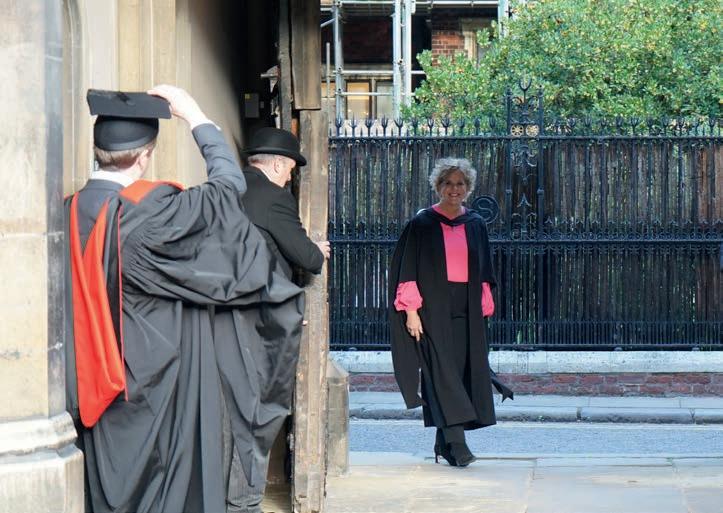
that. It gives you the examples and insights that employers look for.
For example, when the Access & Outreach teams run events, students can volunteer to help in places like Bradford or Kent. I know term time is intense, and students shouldn’t overload themselves, but opportunities like these fantastic. Our bursaries, travel grants and other awards can also make a real difference to people’s lives.
Is there a memorable moment from your previous role that you’d like to share?
The passing of Her Late Majesty Queen Elizabeth II was deeply memorable. I was hosting a diplomatic reception in Paris that evening, and giving a speech when I was handed a note with the news. I had to announce to the room that HM The Queen had passed. Guests were visibly moved as they left — it was a profound moment that will stay with me.
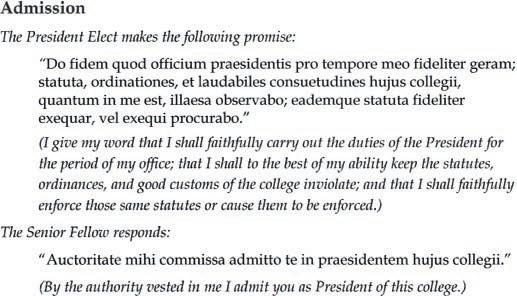
The next day, President Macron gave a speech in English, saying, “To you, she was your Queen. To us, she was The Queen. She will live in our hearts for ever.” That summed it up – the reaction across France was immense. I opened the condolence books at the Embassy the following morning — Macron was the first to sign — and over the next two weeks, 3–4,000 people came through to pay their respects. It felt like a real moment of shared history between our two countries, and I was proud to play a part in that.
Finally, what would you like The Bridge readers to know about you?
Perhaps unsurprisingly given my peripatetic career, I love to travel! But I also enjoy spending time with my family – often at home in Wales –and friends. I love (almost) all sports – so being in Paris for the Olympics and Paralympics was an amazing experience, and I follow football (especially Chelsea FC), cricket and rugby. In my spare time, I like to run, cycle and ski – but I’m equally happy sitting down with a good book, or enjoying a stroll in the countryside –preferably with a decent pub lunch on the way!
After a career in diplomacy and public policy, I remain deeply interested in world affairs and current events. I’m also hoping to reconnect with music here. I used to play the violin, and I’d love to pick that up again and bring some music into the Lodge.
It’s such an honour and a privilege to be here, and to be the first woman to hold this position after 40 men and 577 years. Gender equality is very important to me, and moments like this really matter.
Please send your news & photos to
In August, Joy Hunter (2016) and the team at the British Independent Film Awards launched the fourth season of the BIFA Podcast. The first episode of the season, which dropped on August 20th, featured actor Will Poulter as the guest. Joy, along with cohost Karis Aldridge, invites guests to reflect on the moments that inspired them, their on-screen influences, memorable cinemas, and career highlights. Other guests include David Jonsson, Celia Imrie, Tim Key, and Stephen Merchant.
All episodes are available to watch on YouTube, and in audio format wherever you usually listen to podcasts!
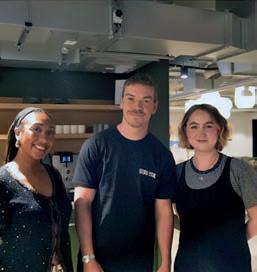
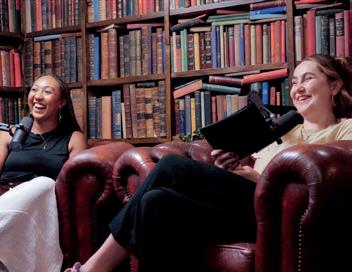
Professor Bart Lambrecht (1992) received the 2024 Distinguished Academic Award by the British Accounting and Finance Association at its annual conference in April 2025. The BAFA Distinguished Academic Award is presented annually to an academic who has made a substantial contribution to the academic accounting and finance community in the UK.
Professor Lambrecht is Director of Studies in Management Studies and a Fellow Commoner at Queens’. He is Head of the Finance subject group at Cambridge Judge Business School, and Director of the Cambridge Endowment for Research in Finance. His research interests span a range of corporate finance topics, including investment under uncertainty, real options, mergers and acquisitions, payout policy, partnerships, corporate insolvency and capital structure.
Professor Lambrecht’s extensive research in finance and his contributions as a journal editor have played a crucial role in advancing the field, making him a deserving recipient of this year’s honour. As the founder and lead organizer of the annual Cambridge Corporate Finance Theory Symposium, now in its twelfth edition, he has made a valuable contribution to the research environment for finance academics in the UK and beyond.
To keep up to date with alumni news and events, and what the Alumni and Development Office is currently up to, follow our account on X @QueensAlumni
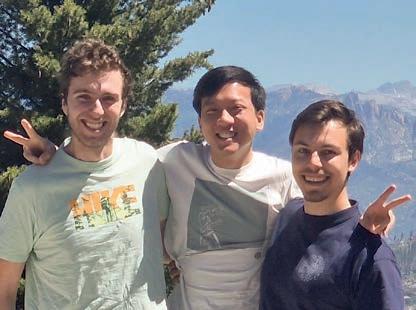
Jakub Suchanek (2018) (pictured left) and his co-founders were recognised in Forbes 30 Under 30 Europe for their work in robotics. He cofounded a startup during his time at Cambridge with the aim of accelerating robot development by testing millions of designs in simulation. The team is already piloting their technology with Hilti and has developed construction robots, the first of which have been sold in Singapore.
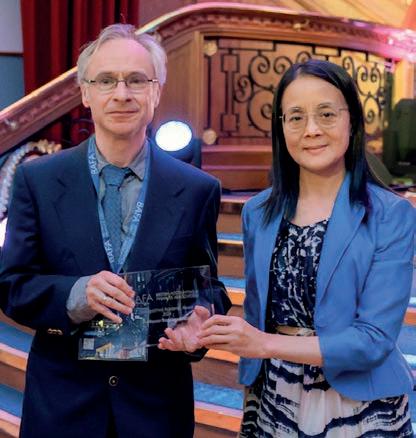
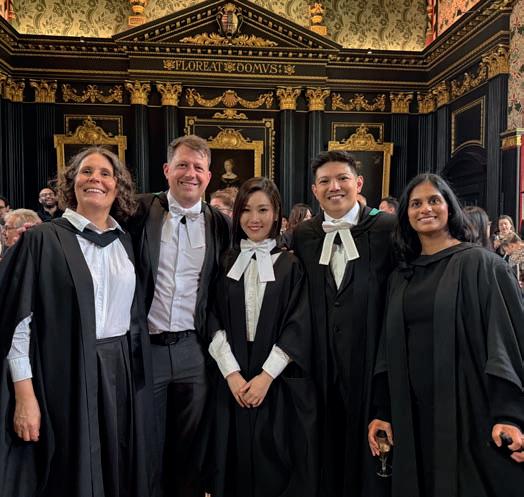
Following their graduation ceremony, Jingnan Li (2023) expressed her gratitude to Queens’ for the warmth and support that her Executive MBA class received during their two-year, part-time course.
“From the very first day, Queens’ has felt like a true home for us. The warmth, care, and sense of tradition you extended to us made each visit—no matter how brief—memorable and comforting,” she wrote.
Our congratulations go to all Queens’ members who graduated this year, and we look forward to staying connected as you begin the next stage of your journey.
In September, Dr Ankita Anirban (2014) returned to Queens’ as a Distinguished Academic Visitor. Taking a sabbatical from her work as a Senior Editor for Nature Reviews Physics, she decided to return to Queens’ in order to work on her first book, which focuses on Bell Labs’ minority outreach programme and the people who formed a Black scientific community.
“I remember when I was doing my PhD here, it’s much easier to focus surrounded by other people who are researching and writing. I wanted to come back to Queens’ to feel that environment again while I work on my book.”
For a preview of the book, you can check out Ankita’s feature article by following the QR code.
Keep an eye on our Alumni Publications webpage, where the book will be featured once it becomes available.
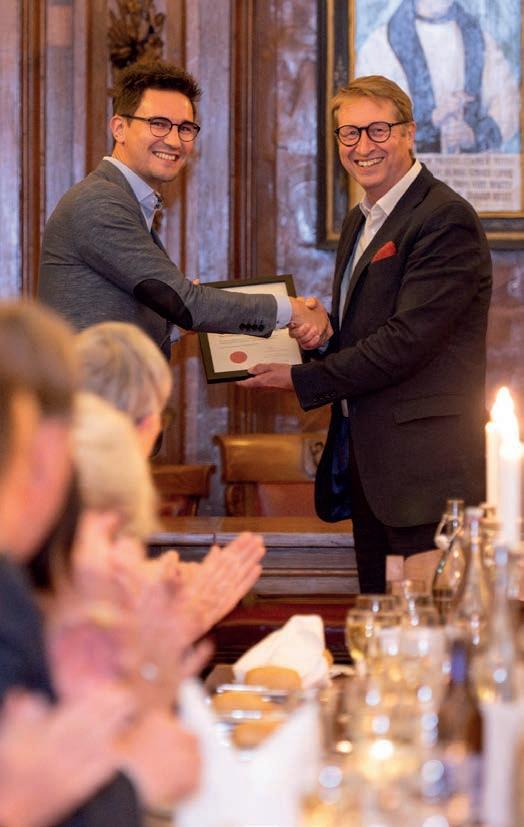
Dr Chris Hill (2007) recently received the Lister Institute Research Prize, which recognises exceptional early-career biomedical scientists in the UK. Through an innovative combination of structural biology, biophysics, and high-resolution imaging, Dr Hill and his team investigate how RNA viruses such as SARS-CoV-2 and polio hijack host cell machinery to generate viral proteins, a process central to the life cycle of many human pathogens.
Their goal is to develop an integrated understanding of how structured RNA elements regulate viral protein synthesis, providing vital insights that could pave the way for new antiviral strategies.

“Winning the Lister Prize will have a huge impact on my research programme,” Dr Hill says on the Lister Institute website. “The flexible, long-term funding will enable me to invest in an entirely new area, building workflows, collaborations and expertise for in situ structural biology. I am delighted to join the vibrant and exciting community of Lister Fellows, and I look forward to engaging with the Summer Studentship scheme as a way of supporting ambitious and talented undergraduate scientists.”
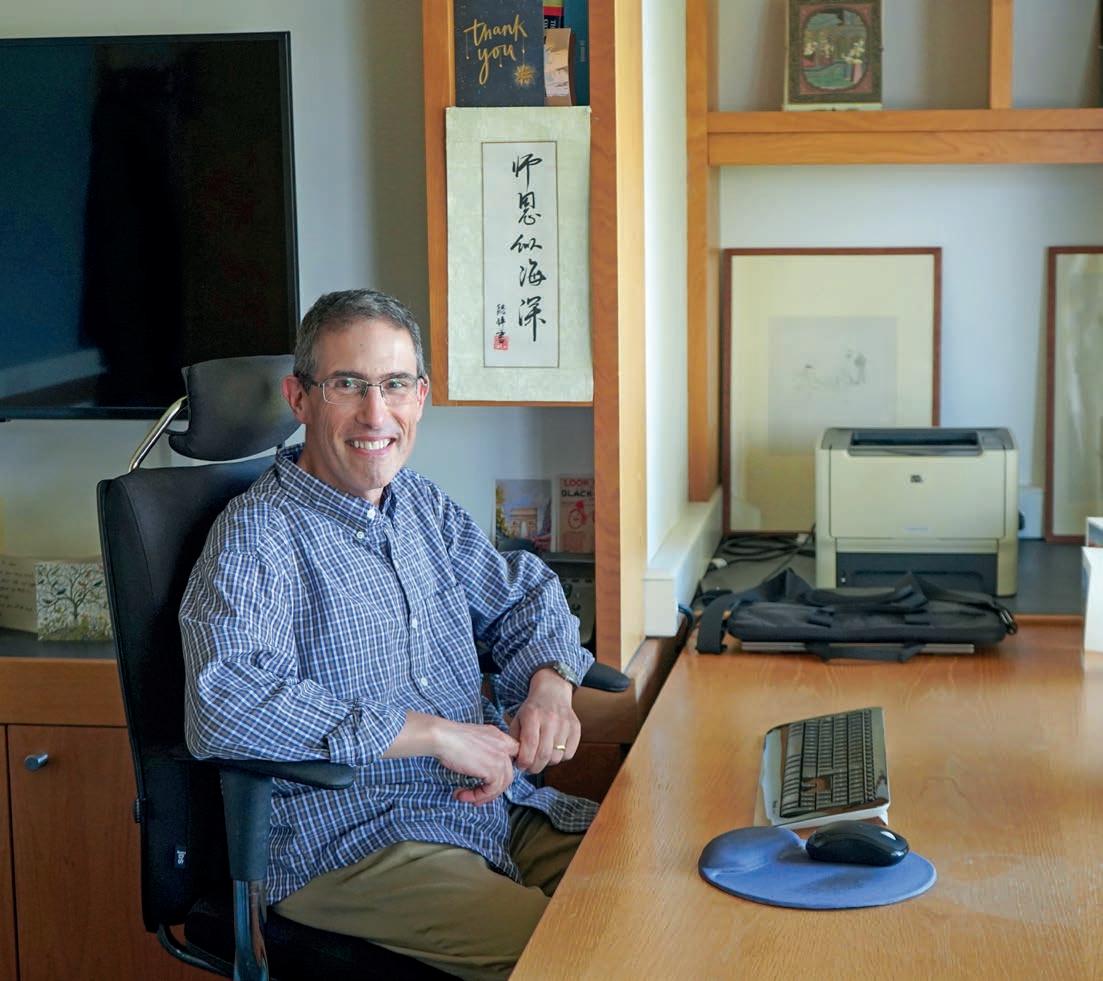
Since 1995, Professor Andrew Gee (1987) has applied engineering principles to medicine, with a focus on image processing. Over three decades, he and his colleague Professor Graham Treece (Bye-Fellow) have developed techniques to extract information hidden in ultrasound and CT scans, work that has proved transformative across multiple fields.
“It’s been a privilege to work with Graham alongside amazing clinicians at Addenbrooke’s and elsewhere,” he says. “We don’t come up with the medical questions ourselves. Medics come to us with questions they’re puzzling over, and we provide the techniques to answer them. Every few years we work with a new clinician, and it’s fascinating to learn from so many different areas.”
One long-running collaboration was with rheumatologist Dr Ken Poole, exploring why some osteoporotic bones are more prone to fracture. Hundreds of CT scans revealed early signs of weakness in cortical bone, the dense outer shell that gives bones most of their strength. “It can become so thin that it’s hard to detect in CT scans,” Professor Gee explains. “That’s where our expertise comes in. We can bring it back into focus and map weak spots that indicate a predisposition to fracture.”
The work progressed from identifying vulnerabilities to testing how effectively pharmaceutical treatments targeted them. “We would scan patients at the start of treatment and again two years later to see whether the therapy addressed the weak areas,” he says.
The team’s research even caught the attention of paleoanthropologists. “That was a surprise,” he admits. “They asked if our methods could be applied to fossilised remains. Of course, the difference is that in medicine you rely on hundreds of scans for statistical validity, while with fossils you often have just one bone. Still, it was fascinating. They could look at our images and say, ‘That thickening suggests tool use.’ That’s their expertise, not mine, but it was extraordinary to contribute.”
More recently, Professor Gee has worked with Professor Manohar Bance, an otologist at Addenbrooke’s who specialises in cochlear implantation and performed the world’s first gene therapy treatment for auditory neuropathy, restoring the hearing of a British toddler who was born deaf. “The surgery is incredibly delicate. Drilling past the facial nerve to reach the inner ear carries substantial risk,” he explains. “We help by analysing CT scans to understand the anatomy better. That means safer surgery, more personalised choices of implants and easier post-operative programming tailored to each patient.”
At Queens’, Professor Gee also has a strong presence in teaching. The College’s distinctive Engineering supervision system, which uses larger cohort classes alongside traditional supervisions, was in part shaped by his belief in collaborative learning.
“ We make sure students understand where the money comes from. These awards are possible because of donors’ generosity and trust.”
“Teaching has to go hand in hand with learning,” he reflects. “It’s not passive, it’s social. Students learn just as much from each other as from me. I’m happiest when I see them booking study rooms and working together.”
A theme he impresses on students is the need to “enjoy being stuck.” He recalls helping his daughter with GCSE maths: “I couldn’t solve a problem straight away. I remember her getting quite upset, worried about her homework deadline, but I was wide-eyed with wonder, excited to discover what it was I was missing. That’s what engineering problem solving is: being stuck most of the time until the breakthrough comes. If you can’t enjoy the struggle, you’ll struggle. If you do enjoy it, you’ll thrive.”
As Financial Tutor, Professor Gee helps oversee Queens’ bursaries, grants, and scholarships. The College is proud to top up the Universitywide Cambridge Bursary Scheme with its own Additional Queens’ Bursary, which has risen in line with inflation. “It’s expensive, but it makes a big difference to students who would otherwise find it difficult to make ends meet,” he says.
His greatest satisfaction, though, comes from reading student reports after travel grants. “They can be life-changing experiences,” he explains. “When I was an undergraduate here, I funded my own trip to India, and it completely changed my outlook on life. Now I see our students returning from volunteering projects or research abroad with the same sense of transformation. That’s enormously rewarding.”
He also emphasises the importance of stewardship. “We make sure students understand where the money comes from. These awards are possible because of donors’ generosity and trust. That in itself is an education; recognising that the College’s resources aren’t limitless, and that giving plays a vital role in sustaining opportunities for future generations.”
Looking back over three decades as a Fellow, Professor Gee notes huge growth in the pressures faced by students. “When I was an undergraduate, tuition was free and maintenance grants were automatic. Now students face significant financial stress. On top of that, social media and recruitment practices have created intense pressure to secure internships. Many feel that without one, they will be limited in their choice of graduate jobs, and sadly, they’re not entirely wrong.
“I try to give another perspective,” he adds. “I encourage them to use our travel scholarships to do something different, something that broadens their horizons. Employers should value that too.”
Reflecting on his career, he returns to the principle that has shaped his teaching: a belief in shared learning. “I almost judge success by how little I have to do,” he explains. “If students are teaching and learning from each other, then it’s working. My job isn’t to hold their hands, it’s to steer.”
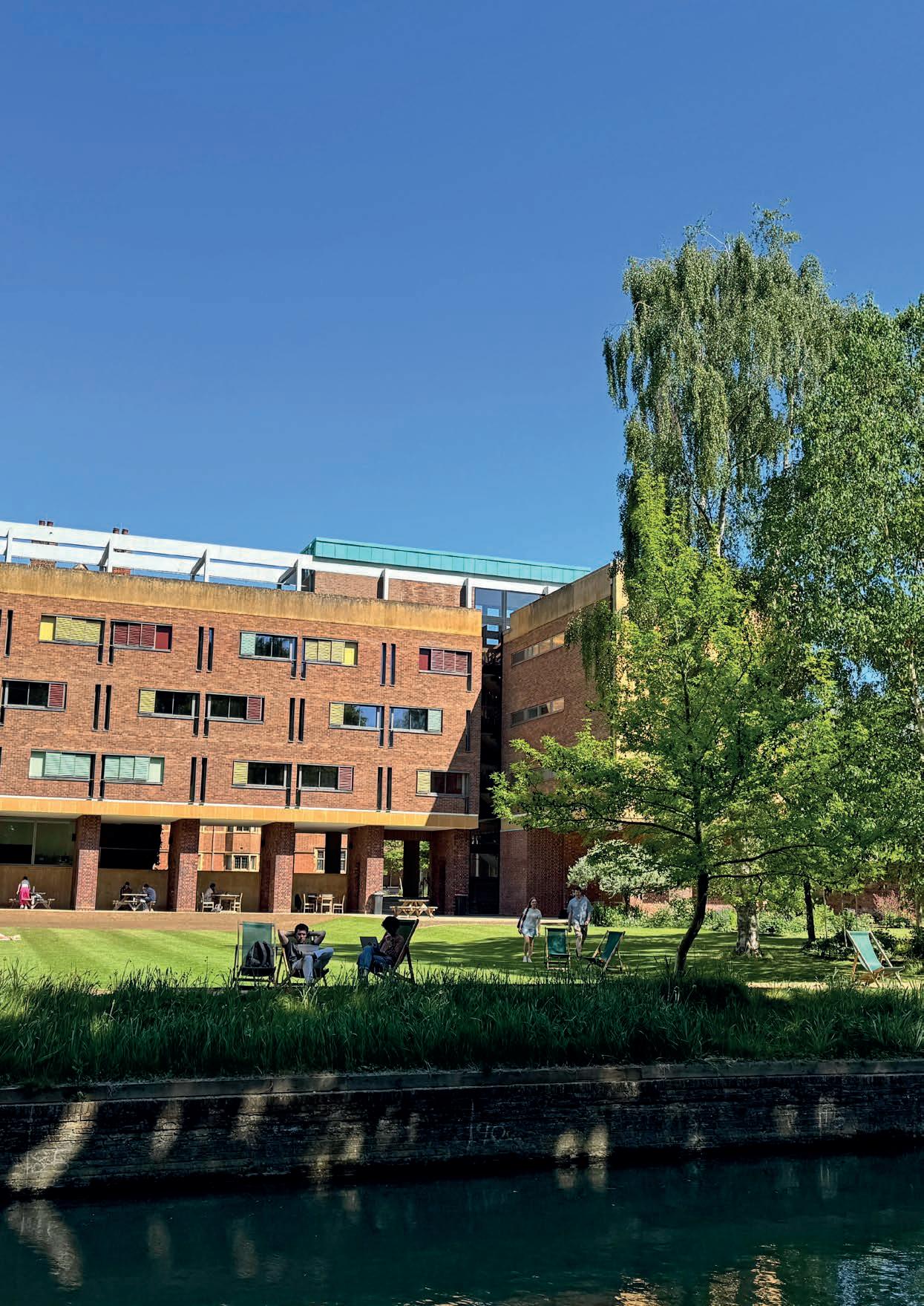
The refurbishment and decarbonisation of the Erasmus Building was completed ahead of schedule in May. This transformative project, made possible entirely through the generosity of alumni and friends, marks the beginning of a new chapter in Queens’ efforts to create a sustainable and accessible College estate for the 21st century.
The Erasmus Project was designed to meet the environmental demands of today while safeguarding the long-term resilience of one of Queens’ most iconic buildings. Alongside major improvements to energy efficiency, the works have significantly increased accessibility, including the addition of the College’s first fully accessible room on the Dark Side.
This is the first in a series of planned major refurbishments, reflecting the Governing Body’s commitment to decarbonisation and access throughout the College estate.
• Replacement of single glazing with highperformance triple glazing
• New roof and wall insulation to reduce heat loss
• Smaller windows and solar shades to cut summer overheating, reducing heat gains by 60%
• Gas heating replaced by roof-mounted Air Source Heat Pumps
• Integration of the roof into a low-carbon heat network
• Solar panels generating clean electricity
• MVHR units recovering heat to reduce energy use – 75% energy reduction to heat water, the primary energy consumption of the building has been reduced by 85%
• Upgrades will result in a 90% reduction in carbon emissions, equivalent to 50,000kg per year
• Installation of a lift
• Creation of the College’s first fully accessible room on the Dark Side, with adaptable fixtures

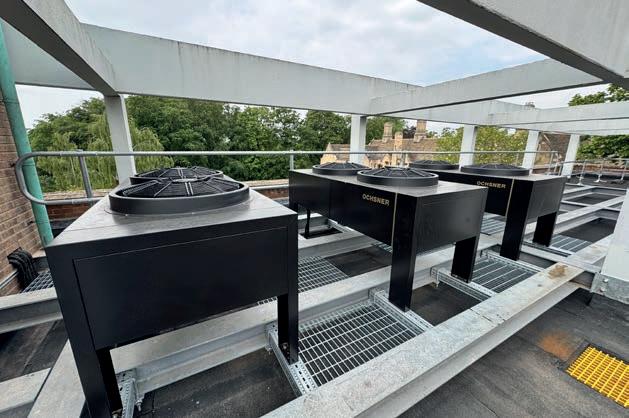
This milestone has only been possible thanks to the generosity of the Queens’ community. Every gift, large or small, contributed to a project that will benefit generations of students to come.
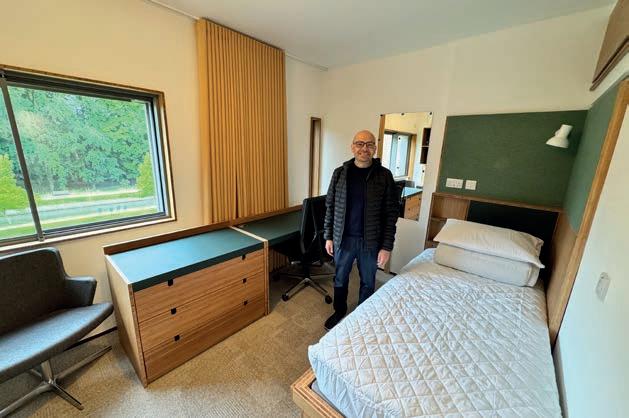
From top to bottom:
Solar panels now generate clean electricity.
New air-source heat pumps are also powering some of Friars’ Court. Sir Demis Hassabis (1994) in his old Erasmus room, K26, post-refurbishment
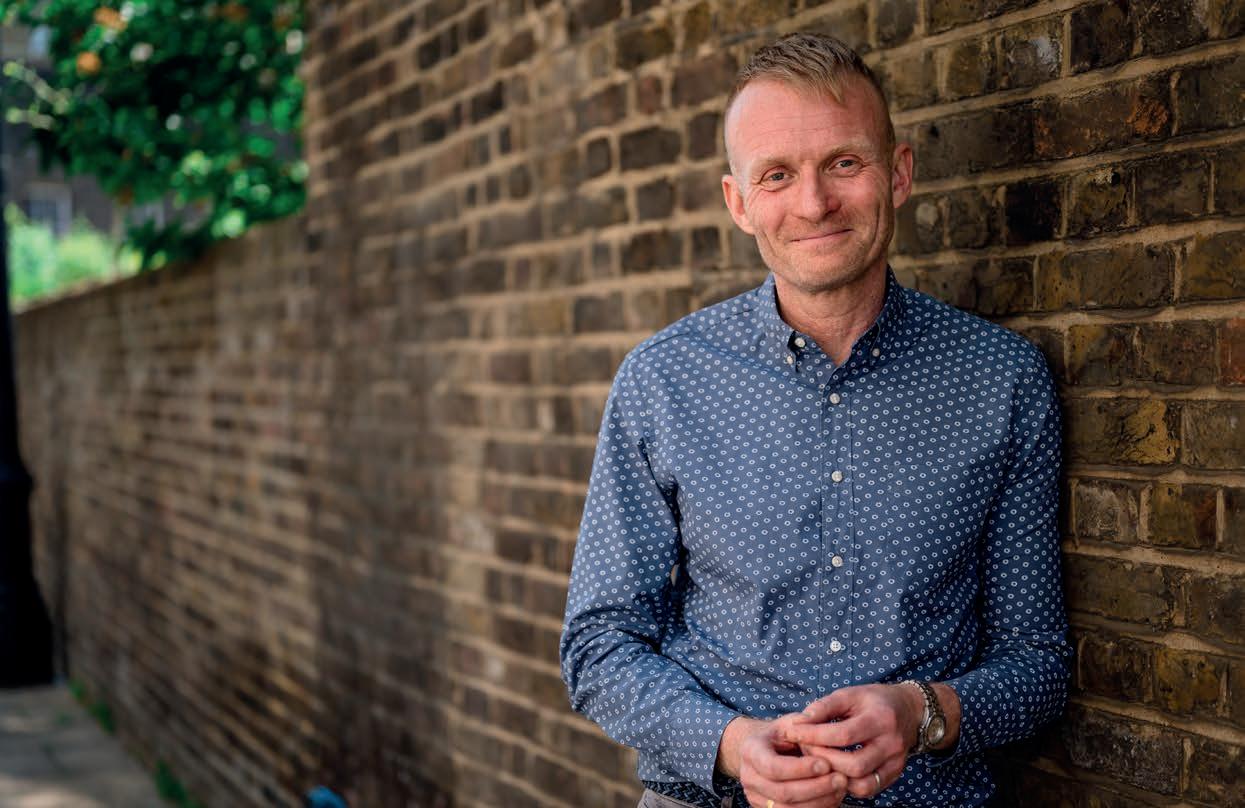
Recognised in the New Year’s Honours list with an MBE for services to LGBTQ+ Culture, Matt Cain (1994) is a writer, broadcaster, and a leading commentator on LGBTQ+ issues. His latest novel, One Love, was inspired by his time at Queens’. Earlier this year he spoke to The Bridge about his career in journalism and writing, his activism, and his memories of life in Cambridge.
Growing up in the working-class north, we didn’t hear about open days at my state school, and the whole culture around them wasn’t what it is today. I came down to Cambridge for a day and walked around the Colleges by myself. There was no one to speak to, but when I stepped into Queens’, I felt an emotional connection. It felt like I was in the right place, and I was absolutely right.
I had been ostracised for my sexuality in my youth, so it was both exhilarating and a huge relief that this wasn’t an issue at Queens’. It wasn’t just amongst fellow students, but the porters and the bedders; everyone knew who I was. It was 1994, and you couldn’t take it for granted that you would be accepted, but I was open about who I was from the start, and I felt celebrated. I felt like it was one of the things people loved about me.
That being said, the experience that I’d had at school was so completely different to the Cambridge experience that I sometimes felt all at sea. But I don’t think Queens’ could have done any more. Back then, the standard offering of mental healthcare was basically rock bottom, but at Queens’ it was very good. My tutor, Rod Jones (Life Fellow), was brilliant; he was always looking out for me, as were the porters. We also had the nurse, Mairi Hurrell (Honorary Fellow), who everybody loved, and I went to see on many an occasion.
I felt welcomed into a warm embrace that was entirely at odds with my previous experience of education. I can honestly say that my time at Queens’ was possibly the most positive and fulfilling experience of my life, and it made me who I am today.
I had absolutely no idea what I wanted to do as a career when I started at Queens’. I often say in interviews now that I always knew I wanted to be a writer, but I didn’t know how to do it. That’s not quite true. There’s a saying, “If you can’t see it, you can’t be it,” and growing up, I
didn’t know anybody, even in the outer fringes of my community, who made a living from writing. It just didn’t occur to me that I could do it.
When I got to Cambridge, film and TV still felt quite inaccessible. This was before the digital revolution, so if you were creative, you were drawn towards student theatre. I directed the May Week production at Queens’ and did a show in the Fitzpat. It was all brilliant, and by the time I left four years later, I knew I wanted to do something creative.
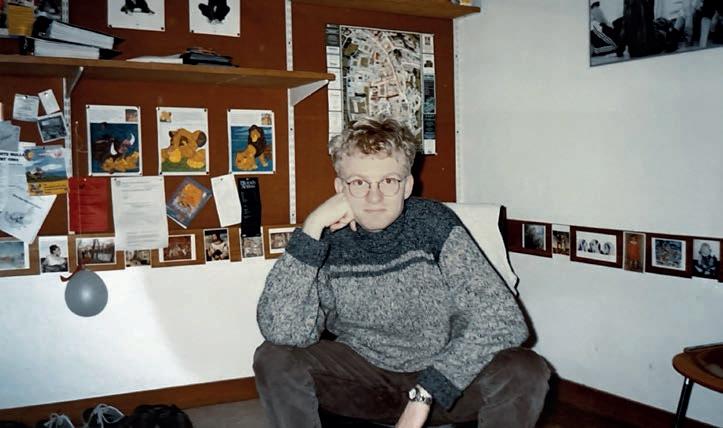
“My creativity was unlocked at Queens’”
I started out my career making documentaries for ITV, when the big trend was for access docs. I worked on three, but the one I’m most proud of is the year I spent following Ian McKellen, documenting his life as both an actor and activist. He came back to Cambridge, he was at Catz, and he gave a talk there. It was a real privilege to work on that project, and we’ve stayed in touch since.
I left ITV after ten years and was approached by a head-hunter for ITN, who make Channel 4 News. They were looking for a journalist from a non-conventional background, someone who wasn’t a typical news journalist. They certainly got that with me; I wasn’t even a journalist! But I had specialist knowledge in the arts and culture, and I knew a lot of people in that world.
Channel 4 has a public service remit to represent minorities, to be the voice of people who don’t always see themselves on screen. Dorothy Byrne (President, Murray Edwards) was the Commissioning Editor for News and Current Affairs at the time. She changed my life. She wanted somebody on screen who was different and could appeal to minorities, and she felt very passionately about arts and culture news reporting, so she hired me. I would never have put myself forward for the cut-and-thrust of the daily newsroom, but they said that they wanted somebody who was going to break the mould, and that appealed to me.
It wasn’t always easy. Newsrooms are competitive, fast-moving places. Now that I know I’m autistic, I know I like routine and I’m not very good with surprises, which are a constant in a newsroom. I didn’t realise any of that back then, but I loved that job, it was brilliant, and it definitely opened doors.
I’d met and interviewed writers and agents with ITV, and I made sure I was across every literature or publishing story that came up at Channel 4. I could see a path forming, and I don’t mind admitting that part of the reason I took the job at Channel 4 was that I knew it would help set me up. After three years, I had my book deal, and it felt like the right time to move on.
I’ve always had a passion for social justice. I went on an undercover mission to Russia to write an article for the Guardian and I was
terrified, but I was also appalled. I remember signs in shop windows that said, ‘No gays in here,’ and all the activists that I spoke to had been beaten up, ostracised from their families, or kicked out of their homes. I felt passionate about reporting on it, but I remember getting on the plane home and being grateful to be out of there without having been arrested.
I got an email from the Foreign Office a few days after I got back, and I was called into Downing Street to meet with three people from the Foreign Office who all had codenames. They told me they thought what I did in Russia was great, and they were really glad I did it, but they said I could never go back again because I would not be safe.
I won’t be going back, and I don’t want to, but I felt really passionate about it. I do feel frightened by things, but I never let it stop me.
I’m now a patron of LGBT+ History Month and an ambassador for Manchester Pride. I got in contact with Manchester Pride when I was the Editor-in-Chief of Attitude. It’s my home city, I love it, and I felt it deserved more visibility in the magazine. One Love is actually set over the Manchester Pride long weekend.
I’m also an ambassador for the Albert Kennedy Trust. When I was at Attitude, I received a press release from them that really struck me. It said that at the time, 25% of young people who were homeless identified as LGBTQ+, even though the same figure in the general population was just 1–2%. I wanted to draw attention to that, so I went out with some frontline workers. I slept rough on the streets and spent another night in a homeless shelter, and I wrote about the experience. When you hear about these things and feel moved to make a difference, you have to do something.
When you’ve always had to fight for things, when you’re used to being disrespected and having to prove yourself, it’s quite difficult to sit back and enjoy things, even when you get to the place you were working towards. By the time I got there, I was in my 40s. I could never take it for granted, and there’s always that fear that it could all be taken away.
When I received my MBE, people asked me if it was a dream come true. But the truth is, it was
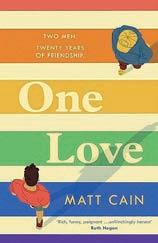
Matt’s latest novel, One Love, is available now in all formats.
far beyond that. When I was growing up, gay men were treated like pariahs. They were seen as dangerous, disease-carrying predators. They weren’t celebrated; they were hidden away in shame. Nobody received Honours.
That’s why I was especially proud that mine was specifically for services to LGBTQ+ Culture. It had been such a battle to get published and to introduce my books to mainstream audiences—I had to crowdfund to publish The Madonna of Bolton. So to be put forward by the Prime Minister to be recognised in the King’s New Year’s Honours was something I could never have imagined growing up.
It was a gradual process, but my creativity was unlocked at Queens’. From there, I worked towards the role I wanted, albeit meandering through other industries. My novel, The Madonna of Bolton, tells that story: someone who wants to be a writer but doesn’t know how to get there. A large part of it is set in Queens’. He goes to a fictionalised College called St Cristopher’s… but it’s Queens’, really. There’s no attempt to hide that in the description! My latest novel, One Love, although set in Manchester, is heavily influenced by my Queens’ experience.
I had a great time at Queens’. It’s where I found my voice, and it set me on the path to becoming a writer. I still feel like I’m coming home when I go back.

To read the full conversation, head over to our website
On a quiet night in June 1940, College members were awoken by the arrival of hundreds of troops who had been evacuated from the beaches of western France in a manoeuvre known as Operation Aerial. Queens’ welcomed these troops through its gates, feeding and accommodating them for as long as was required.
Blast shelters had been erected around the entrances to each staircase, three dressing stations were established, and underground air-raid shelters were dug into some of the College’s lawns. Should the need have arisen, the splinter-proof shelters were able to protect 400 residents of the College and 50 members of the public.
Beyond the material changes to the College during WWII, the composition of the resident student body was also drastically altered. Across a five-year period, the number of Queensmen reduced by about half. Yet Queens’ was busier than ever: around 40 sets – two students to a set – were occupied by the staff and students of St Bartholomew’s Hospital who had been evacuated from London, and many Queens’ students remained in residence outside of term time to volunteer for Air Raid Precaution duties.
“A date five years from now has become the remote and unpredictable future.”
Dial Magazine, No. 95
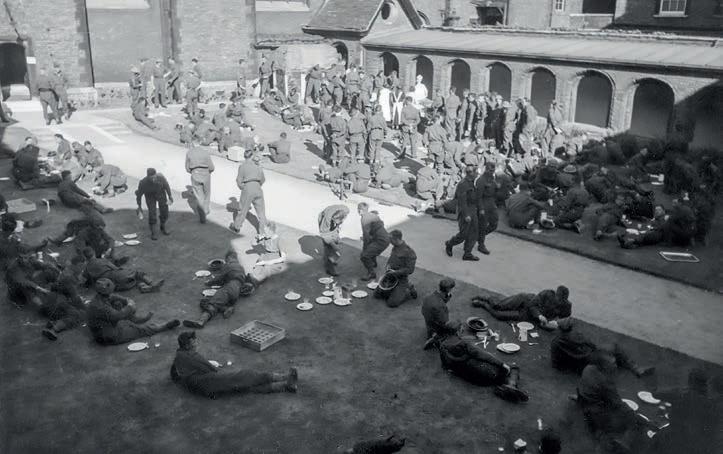
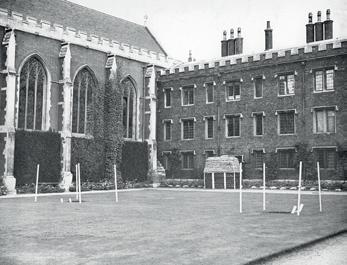
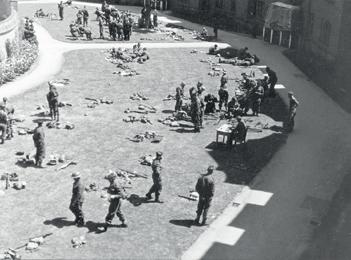
“We should like to take this opportunity of putting on record our sense of indebtedness to the College servants in the Office, the Kitchen, the Porters’ Lodge, the Garden, and on the staircases… During the war Mr. Chamberlain (Kitchen Manager) and his staff served three meals a day for everyone in residence. Mr. Chamberlain’s unremitting energy and resourcefulness repeatedly saved difficult situations… [such as] the occasion when we had to cope in the middle of the night with hundreds of soldiers from the beaches of France in 1940.”
Dial Magazine, No. 95
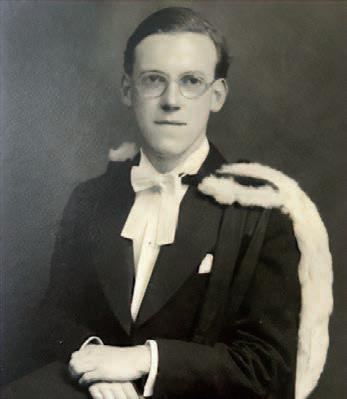
Graham McCall (1939) was reading Engineering at Queens’ during this time. His experience of living and studying at the College was heavily shaped by the realities of war.
The month before his scheduled return to Cambridge to complete his final year of study, Graham was drafted into war service. Given his academic background, Graham served with the Royal Electrical and Mechanical Engineers (REME), the unit responsible for maintaining and repairing equipment such as tanks, vehicles, and weapons. Graham served in Italy, France, Holland, and Belgium, obtaining the rank of Major.
A few years later, he married Lea van der Stock in Antwerp and they settled in Yorkshire where Graham began working at Churchill Redman, a British machine tool manufacturer, rising through the ranks to become Managing Director. Churchill Redman was acquired by Tube Investments in 1966, so the family relocated to Solihull and then London before Graham retired in the 1980s. In 1984, the couple decided to follow in their daughter’s footsteps and emigrate to Australia. Graham shipped his pride and joy, a 1957 Bentley Continental, to Australia with him which he toured extensively around the country.
Despite the distance, Graham’s fondness for Queens’ never faded.
Following his death in 2020, the College received notification from his daughter, Andrea, that Graham had generously remembered Queens’ in his will. In line with his wishes, Graham’s bequest was directed to the College’s Unrestricted Fund to help repair, maintain, and improve our estate.
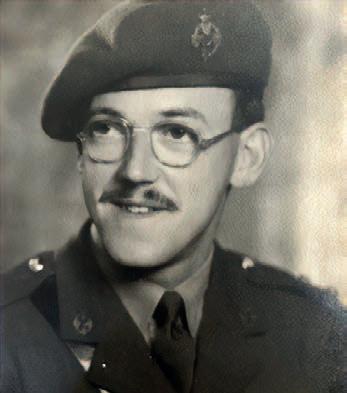
“His memories of his time at Queens’ were always positive, despite the interruption to his studies caused by the Second World War.”
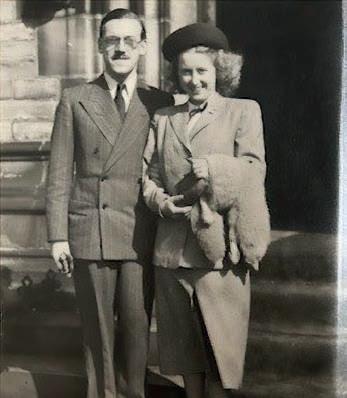
In 2023, we had the great pleasure of welcoming Graham’s daughter, Andrea, and her friends, to the College. It is to our delight that we remain in contact with Andrea, who resides in the family home in Victoria and is enjoying retirement following a successful career in private enterprise and a stint in the Victorian State Parliament.
We are greatly indebted to Graham for remembering Queens’ in his will. His is truly an enduring legacy – one that is shaping the lives of our students eight decades since he himself came up to Queens’.
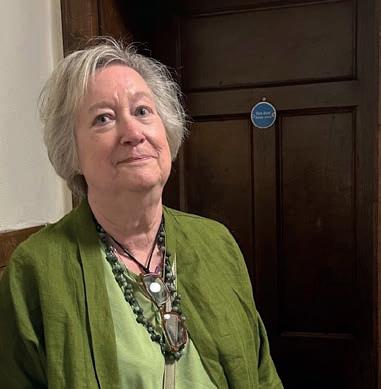
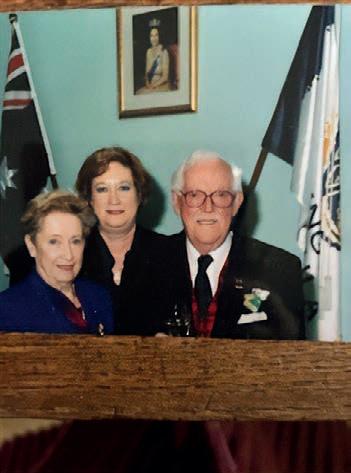
“I felt so proud to walk in my father’s footsteps and to feel some of the affection he had for his College.”
Fisher
We will forever be indebted to the Queens’ members who fought and gave their lives during both WWI and WWII. There is a Roll of Honour mounted in the Chapel, and the student library is known as the War Memorial Library, which serves as a daily reminder to everyone of the sacrifices previous generations made.
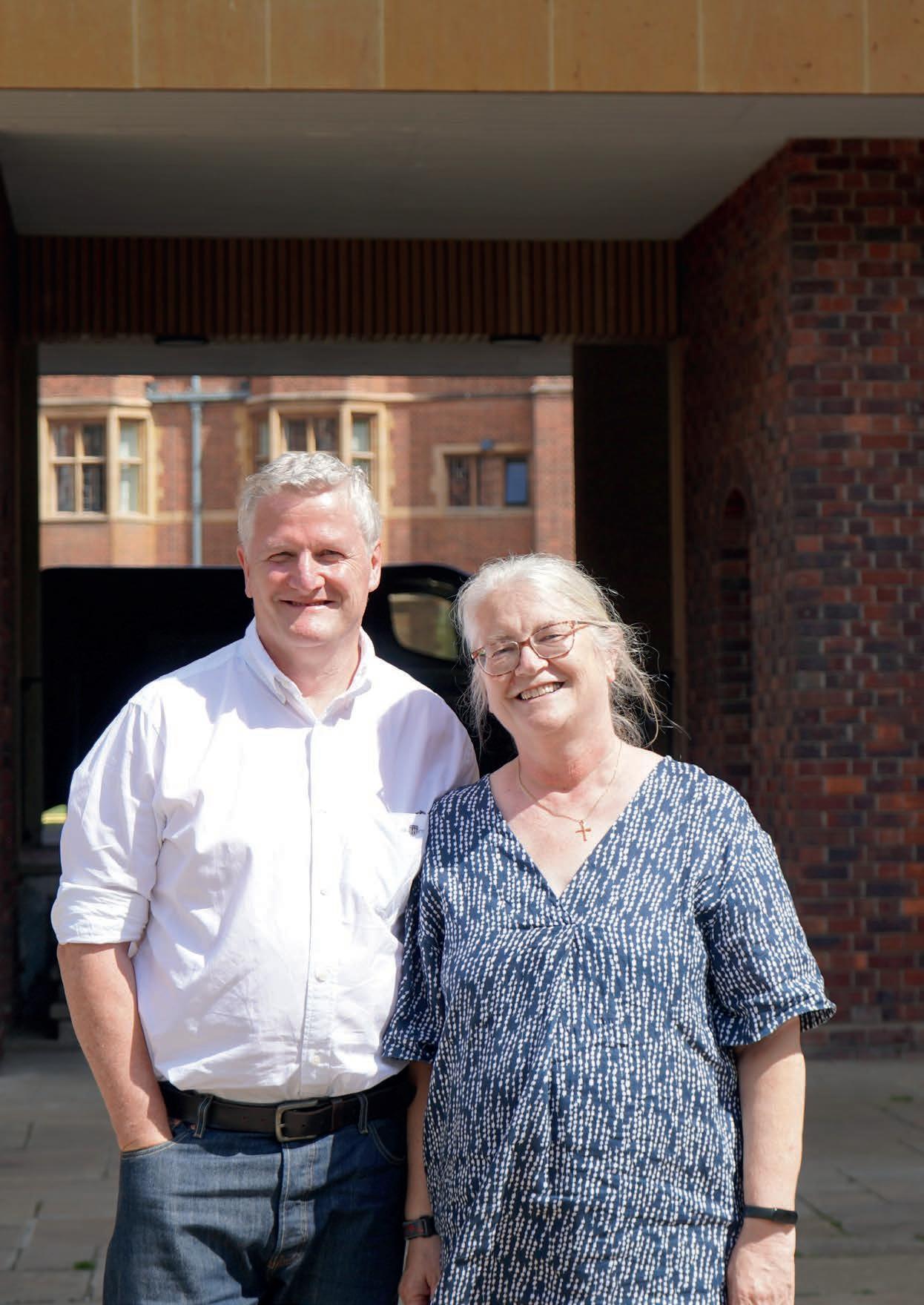
Whilst refurbishing the Erasmus building, our Development team discovered that two alumni, Greg Watson (1983) and Elfreda Tealby (1984), now married, had previously occupied the same room K23 – Greg as a fresher and Elfreda in her second and third years. We had to ask, did this contribute to their meeting and getting to know each other?
This was their answer.
“ If time travel ever allowed us, we could return to K23 in summer 1989 and watch ourselves emerging married from the Chapel.”
Elfreda:
“Greg arrived in 1983 and I joined Queens’ the following year. We didn’t really get to know each other well in my first year, then Greg went to Hamburg for his MML year abroad. Whilst he was away, I moved into K23, where I discovered a few leftover items from previous occupants. In the 1980s the Athena shops were a popular source of affordable posters to decorate student rooms. Their collection included a nowinfamous image of a female tennis player and a lesser-known pig in a hammock. I found both in my K23 upper cupboard – and discarded them.
Fast forward, and I chose to keep K23 for my final year; it definitely was my Room with a View (one of my A-level texts) and, like Forster’s room, it gave me ample opportunity to observe College life as people passed through Walnut Tree Court. On fine days with the window open, I would enjoy hearing the organist practise and it was a privilege to be able to sprint to Chapel with a minute to spare. I was already also a keen cook; the Erasmus rooms were large enough to host dinners for friends and the gyp rooms were better than on many other staircases. Plus it was a quick stroll down to the lawn to gaze at the river – another favourite distraction.
Greg returned from Hamburg and through a mutual friend, Jane Persad (1983), we reacquainted ourselves. (Jane was subsequently an usher at our wedding in College Chapel and we became godparents to each other’s children.) With the inevitable invite to coffee in my room, Greg discovered that I was in his first-year room and jokingly asked whether I had found a pig poster that he had left behind in 1984. Sadly, of course, the answer was yes but no longer available… but it did act as a bit of an icebreaker about why he had the pig in the hammock poster, alongside fierce denial that the Tennis Girl belonged to him, and questions about why I chose K23 for two years. It turned out that I did far more watching out of the window than Greg had ever done (he claimed he had been too busy working head down). Friendship grew over evenings in the bar, a love of music and an interest in sport. We booked the music practice room to play piano and sing together; he lent me his pool cue to play as the bottom pair for the College pool team and
helped me practise; we made a habit of watching American football with a TV dinner taken out of the buttery on Sunday evenings; and I even made it to the Queens’ sports ground a few times to watch Greg play rugby. Quite rapidly, and somewhat unexpectedly (to me) friendship was turning into romance. Greg made a bid memorably and publicly by demonstrating his affection with an embrace in front of the William Morris fireplace in Old Hall. The romance was a bit stop-start, but his choice of William Morris for that first embrace was sound as I already had a love for the Arts and Crafts movement! K23 became our favourite hang-out and thanks to my having it on a full-year basis, it also became a great storage place for Greg’s “Potteresque” old trunk of belongings during the vacs!”
“K23 as my fresher’s room was a boon. The one member of my family who ever had gone to university had talked of a tiny spare room in a widow’s house as his “digs”. My Queens’ accommodation was a decently-sized room (and bigger than the new Cripps rooms which most freshers had). A desk by a large window was perfect for a linguist bashing through hours of translation for Part 1. The tiny three-bar
electric heater was just powerful enough to take the edge off the winter chill or dry a pair of socks. The concrete shelf accommodated my new filter coffee machine (no fancy espresso machines back then). On the other hand, showering meant a trip down a dark corridor and occasionally a queue, and I never did work out quite what to do with a gyp room.
Returning from my year in Germany and starting my final year, K23 was an altogether different prospect, and not only because it turned out to contain a girlfriend and, ultimately, my future wife. The walls were much more tastefully decorated, including some of Elfreda’s own artwork. The space was not just for accommodating rugby kit and dictionaries, but also for a wider range of drinks and a reliable supply of snacks. Dinner parties were held, with Elfreda’s culinary skills deployed to the full despite the constraints of the tiny gyp room. (My one attempt to cook myself ended up in the bin, Elfreda re-cooking it whilst delivering a tutorial.)
And, of course, the revelation that I had been a previous occupant was a great conversation piece in our first days together; the pig poster tale remains a favourite even now. I do, however, maintain my innocence on the charge of having ever owned that tennis girl poster.”
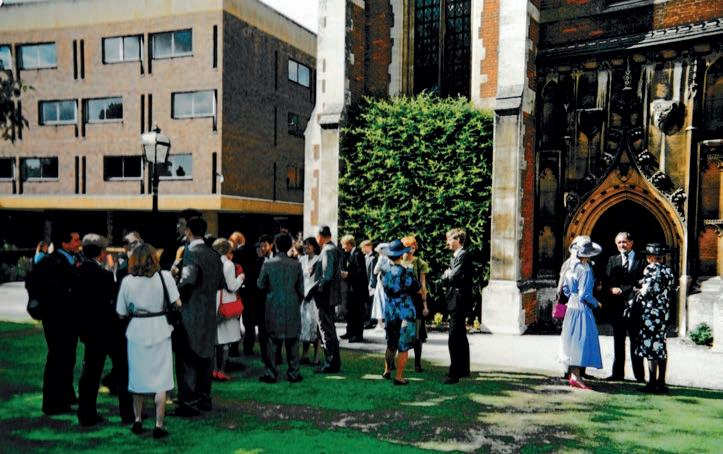
This year’s May Week production saw Bats perform Twelfth Night in Cloister Court. With a new twist on the Shakespearean comedy, Bats transported the audience to the ultimate 60s music festival full of disguises, mistaken identities, and romance in a whirlwind of mischief and rock ‘n’ roll.
As described in Varsity, the production was “well-acted, well-directed, with bursts of complimentary originality[…] a delightful addition to this year’s collection of May Week shows, and a good start to what promises to be a delightful end to a wonderful year in CamDram.”
We look forward to seeing what delights Bats have in store for us this academic year!
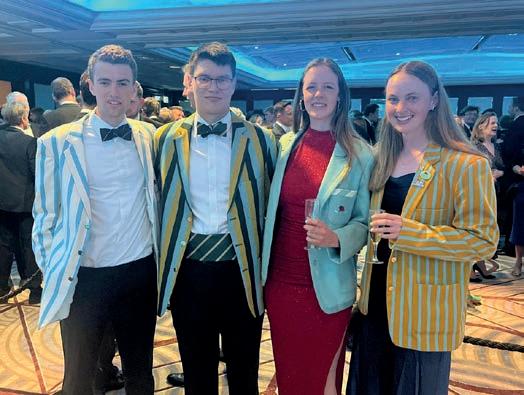
Four Queens’ members took part in the event over two days, where Cambridge took a clean sweep of all six races.
In Saturday’s Lightweight races, Josh Moore (2021) and Gigi Pezier (2022) helped their crews secure new course records, with the Men’s boat winning by 4.5 lengths and the Women’s by three.
On Sunday, Brett Taylor (2020) helped to secure Goldie’s third consecutive victory, while Beanie Spain (2020) and the crew of Blondie reclaimed the title from Oxford’s Osiris.
This marks the fourth time Cambridge has won all six races, with the previous clean sweeps being in 1993, 2018 and 2023.
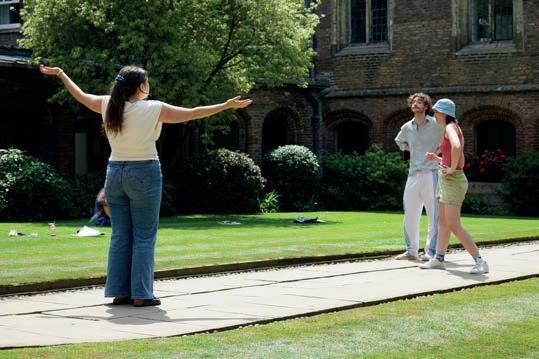
June saw the return of the Staff v Students football match at the Queens’ sports ground. Staff and students showed up to cheer on the teams, including former President Mohamed El-Erian (1977) who showed his support in his Queens’ football shirt.
The match was well fought between both sides, with Porter Gary Reynolds making some key saves for the staff team, resulting in a full-time score of 1-1.
The match was followed by a barbecue at the pavilion.
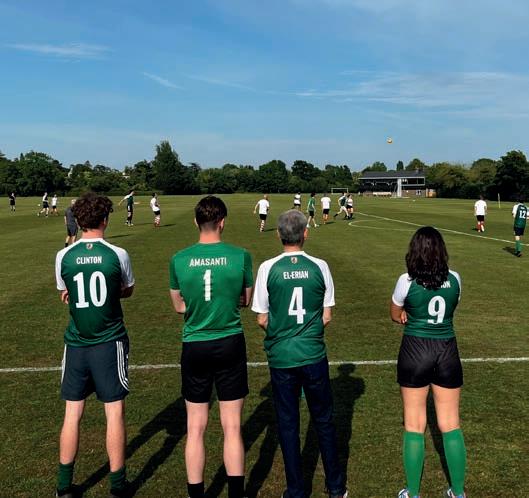
This year, the percentage of Queens’ students earning First Class grades has increased to 34%, higher than the University average of 30%.
President’s Prize (Foundation year): Elijah Denning (2024) was awarded both The President’s Prize and The Extraordinary Prize and is now continuing his studies at Queens’.
Venn Prizes (First years): Jessica Brady (2024) was top of the 1A German Tripos and third in 1A French, Lucas van Heuven (2024) topped the Geography Tripos, Rishik Vishwanathan (2025) was top of the Law Tripos, and Yotam Margoninski Morag (2024) ranked sixth in Natural Sciences.
Hughes Prizes (Second years): Oscar Collin (2023) & Erin Lansley (2023) were top of Architecture and English respectively, with Erin Keeling (2023) second in Part IB Maths and Louis Driver (2023) ranking fifth in Natural Sciences.
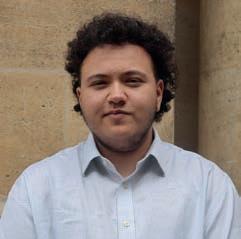
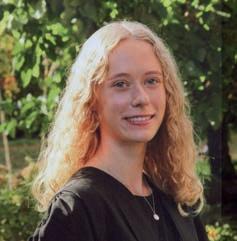
Joshua King Prizes (Third years): Gigi Pezier (2022) topped the Theology Tripos in her first and second years, coming second in Finals this year. Eva Weinstein (2022) was top of the Geography Tripos.
Ruth Hendry Prizes (Fourth years): Thomas Yam (2021) & Guy Flint (2021) topped Engineering and Part III Astrophysics respectively.
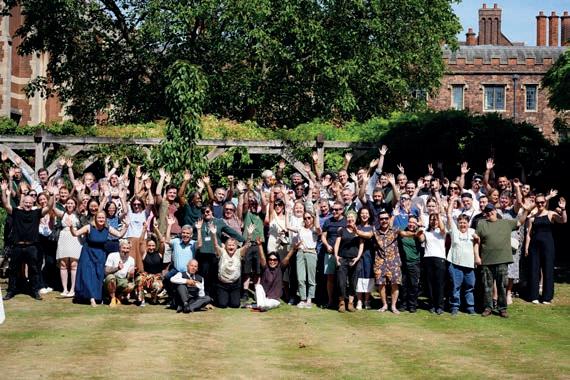
In July, the staff of Queens' College were invited to a BBQ to celebrate Mohamed El-Erian's (1977) time as President.
A sunny afternoon in the President's Garden was filled with laughter and good food, and Mohamed received his leaving gift from the staff, a signed QPR football shirt.
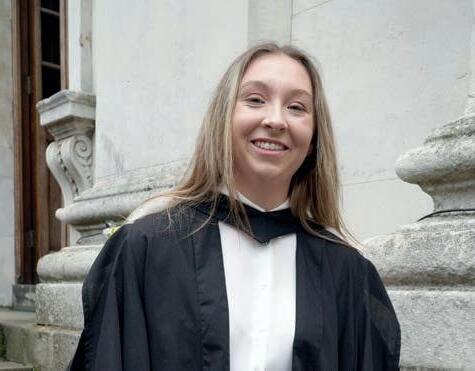
After achieving a distinction in her MPhil, Charlotte Rye (2019) has gone on to pursue a PhD in Psychology at Queens’, focusing on the neural mechanisms of trauma susceptibility and resilience. She was recently named PhD Student of the Year in the 2025 Postgrad Awards, with judges remarking, “The way that Charlotte is combining her academic focus with real-life support for others and using her own experiences to drive change is very inspiring.”
Charlotte was awarded funding from The Treglown Fund, which provides opportunities for undergraduates and graduates to travel abroad for meaningful projects. The fund was established through a gift from the estate of Mr Geoffrey Treglown (1959). Throughout his life, Geoffrey was passionate about enabling young people to explore the world, often leading expeditions to the likes of Iceland, Greenland, and Antarctica in his role as a CCF Lt Colonel. The Treglown Fund now continues this legacy for Queens’ students like Charlotte.
“I received funding to travel to Ghana for three weeks to complete a mental health placement. I spent my time at Manhyia Government Hospital in Kumasi, observing consultations, updating patient notes, and prescribing medications. I was able to learn so much about the history and development of mental healthcare in Ghana, and how this compares to mental healthcare in the UK. Having the opportunity to complete this project has really helped me to thrive academically as I was able to learn a great deal from the doctors and psychiatric nurses about the possible neurological bases to conditions such as Schizophrenia.
When not at the project, I spent my time living with a local family, and as such, I learnt so much about the Ghanaian culture and even had the opportunity to travel to the Cape Coast and Mole National Park to really embrace everything that the country has to offer – something that wouldn’t have been possible without the support I received.”
(Charlotte Rye, 2019)
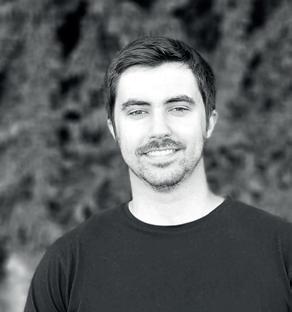
“In this work, we present a high-resolution mathematical model that captures the intricate relationship between DNA replication timing, origin firing, transcription, and chromatin organisation. The mathematical model creates a “null hypothesis” of how genome replication is expected to proceed in the absence of any stress or perturbations. Comparing the model’s prediction with replication timing data reveals that genomic regions where the prediction
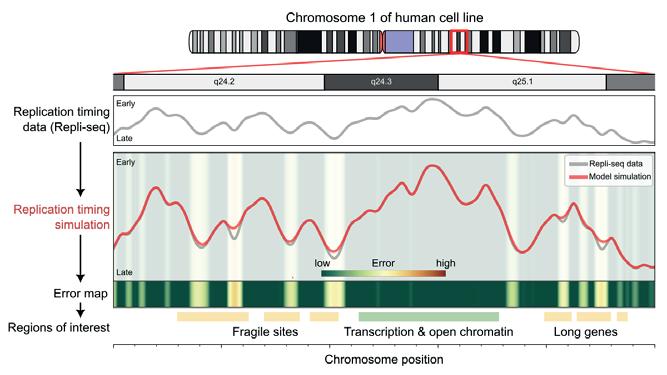
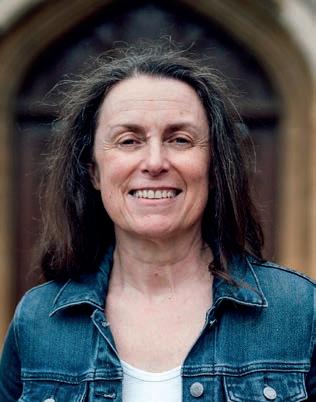
Queens’ College Fellow and Professor of Innate Immunity at the University of Cambridge, Professor Clare Bryant, has been elected as a Fellow of the Academy of Medical Sciences, one of the UK’s most prestigious recognitions for leaders in biomedical and health research.
The new Fellows have been recognised for their remarkable contributions to advancing medical science, ground breaking research discoveries and translating developments into benefits for patients and the wider public. Their work exemplifies
and data diverge often coincide with fragile sites and long genes, while regions of strong concordance are linked to open chromatin and active promoters. In addition to mapping these dynamics, our approach provides a new algorithm for researchers to uncover new regions of the genome that may be susceptible to breaking and rearranging under conditions of replication stress, a hallmark of cancer.”
Our mathematical model creates a prediction of when each position of the human genome is replicated (red curve). Comparing the model’s prediction with DNA replication timing data (grey curve) highlights points of deviation where replication proceeds more slowly than expected, indicating genomic regions that are particularly vulnerable to replication stress.
Francisco has had a recent paper published in Nature Communications, which you can read online here:

the Academy’s mission to create an open and progressive research sector that improves health for everyone.
Reflecting on the honour, she shared:
“I am excited to have been invited to be a Fellow of the Academy of Medical Sciences. This reflects the outstanding science that my incredible research group have generated over many years and it would not have been possible without them”
Professor Bryant is among 54 distinguished scientists newly elected to the Academy this year. She is one of only four academics from the University of Cambridge selected in this cohort.
The prize, established in 1994, in the name of Sir Alastair Pilkington, the first Chair of the Cambridge Foundation, is awarded annually to a select few Cambridge University teaching staff. This year, Queens’ Fellows Dr Tore Butlin and Dr Mairi Kilkenny were both awarded this prestigious prize which aims to acknowledge excellence in teaching and to recognise the contribution each individual makes to a Department or Faculty.
Dr Tore Butlin – Department of Engineering:
Tore has played a key role in reshaping the engineering course content and led the design of the new IA mechanics syllabus.
“I am delighted to receive this award – I love teaching, and am grateful to all my students who continually keep me on my toes, and to the Engineering Department for encouraging creativity in teaching.”
Dr Mairi Kilkenny – Department of Biochemistry: Mairi delivers innovative and creative teaching with the Department of Biochemistry often incorporating digital media to stimulate the interest of her students. She’s also a supervisor for several Colleges and Acting Undergraduate Admissions Tutor for Queens’ College.
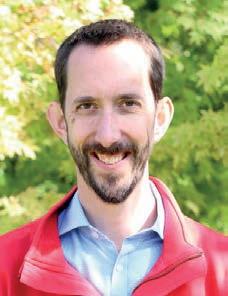
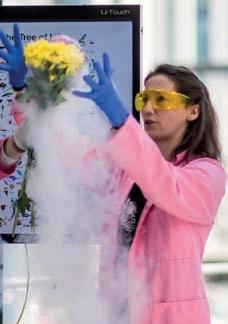
“At Queens’ College, and in the School of Biological Sciences, I am fortunate to work alongside inspiring colleagues and mentors who are driving innovation in many areas of education, including technology-enabled learning and digital assessment. It has given me numerous opportunities to evolve my own approach to teaching, which I am very grateful for.”
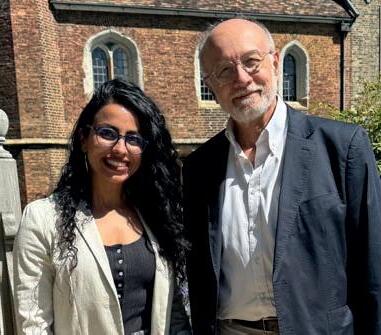
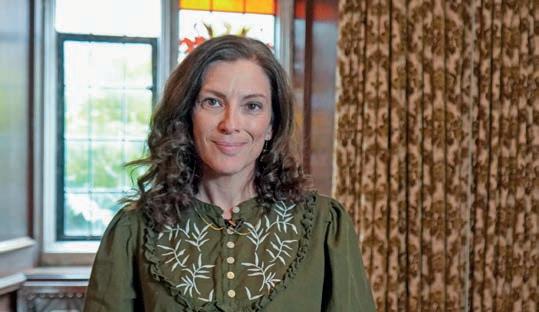
Queens’ Fellow and Vice-President, Professor Marie Edmonds, was elected to the Fellowship of the Royal Society — one of the highest honours in the scientific community.
“I am humbled and honoured to become a Fellow of the Royal Society and to be recognised in this way by my distinguished scientific peers. I would like to thank all of the wonderful students, postdocs and colleagues I have collaborated with over the years and I look forward to working with the Society to promote science for the benefit of humanity.”
Alongside her roles at Queens’, Marie is also Professor of Volcanology and Petrology in the Department of Earth Sciences at the University of Cambridge. Her research spans the fields of volcanology, igneous petrology, tectonics, atmospheric science and economic geology.
As per the official announcement, Sir Adrian Smith, President of the Royal Society, commented on the appointment of this year’s cohort, saying:
“Their achievements represent the very best of scientific endeavour, from basic discovery to research with real-world impact across health, technology and policy.”
Prof Edmonds now joins a highly prestigious cohort of Fellows and Foreign Members whose ground-breaking work has shaped science and society for generations. The list includes some of history’s most influential figures, such as Stephen Hawking, Isaac Newton, Charles Darwin, Albert Einstein, Lise Meitner, Subrahmanyan Chandrasekhar and Dorothy Hodgkin.
Dr Sepideh Razavi, the inaugural Rokos-Menon Senior Research Fellow at Queens’, has been awarded a Presidential Professorship at her home institution in the United States.
During her sabbatical in Cambridge, she has been based at the Cavendish Laboratory, where her research focuses on using lipid vesicles in a microfluidic setup as model systems to study how nanoparticles and surfactants affect the mechanical properties of cell membranes.
Dr Razavi described her time at Queens’ as especially meaningful, highlighting the supportive and enriching fellowship community that has shaped her sabbatical experience.
In August, Development Director Rowan Kitt travelled to India to host a series of events for alumni. Alumni in New Delhi gathered at the Delhi Gymkhana Club for an update on the new developments in the pipeline, and a chance to meet with fellow members of the College.
In Mumbai, the Cambridge Society of Bombay joined Rowan to host local alumni at the Royal Bombay Yacht Club.
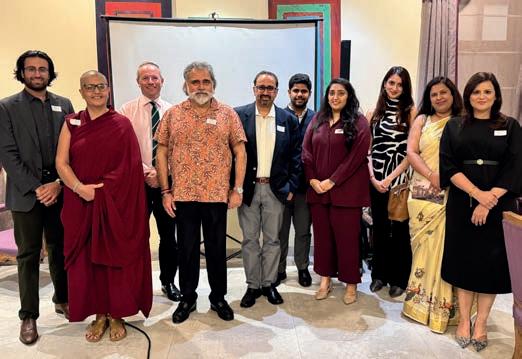
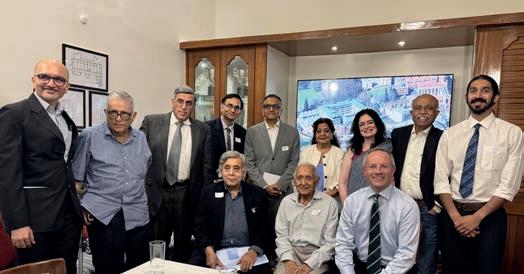
Dr Joseph Pang (1969) deputised as Queens’ Global Ambassador for Hong Kong – a role usually held by his son, Roy Pang (1998) – to host a lunch for alumni based in Hong Kong in March. Over 35 alumni attended the event at the Hong Kong Club, where the Development Director was also in attendance.
Alumni in Southeast Asia gathered for a series of events during the Development Director’s visit to the region. In Thailand, alumni met at the Grand Hyatt Erawan in Bangkok; in Malaysia, a dinner was arranged for old members to connect; and in Singapore, over 60 alumni, students, and guests came together at the Fullerton Hotel for a presentation on the College’s upcoming developments, followed by a grand reception with refreshments and canapés.
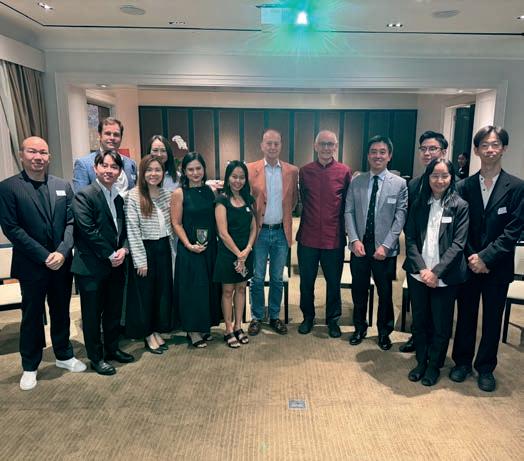
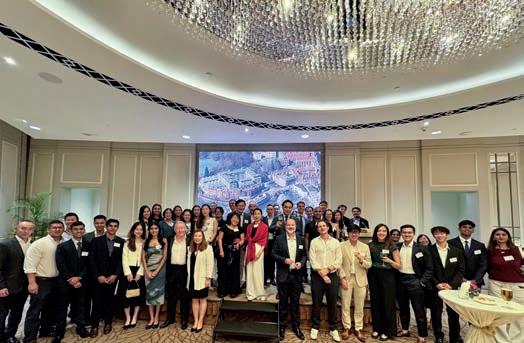
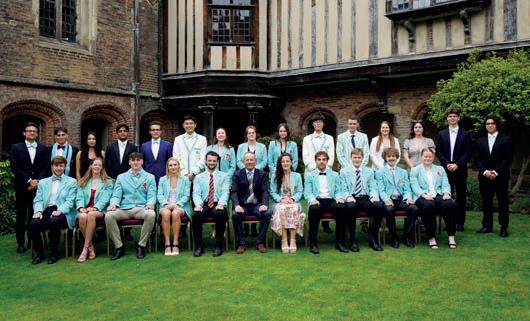
In May, current Queens’ Blues and Half Blues were invited to the traditional dinner in the Munro Room to mark their achievement, preceded by a group photograph in their colours.
Former Blues and Half Blues are warmly invited to save the date for the tenth annual Blues Dinner on Wednesday 6th May 2026
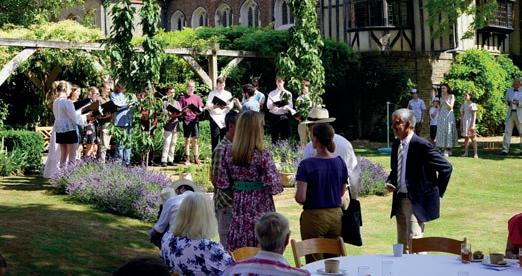
This summer, we welcomed back over 500 alumni to College for the annual alumni and donor garden parties. On Erasmus Laws, our younger guests were entertained by face painting and a bouncy castle, while guests in the President’s Garden enjoyed a series of madrigals performed by the College choir (pictured).
Dr Mohamed El-Erian (1977) gave an update at his final garden party as President, followed by an exhibition of newly renovated student rooms in the Erasmus building.
Following on from regional events in Bristol and Manchester, the Development Director hosted alumni based in Yorkshire for a drinks event at a wine bar near the Ouse.
To ensure that you receive invitations to regional events in your area, please ensure that we hold up-to-date address details by using this form:
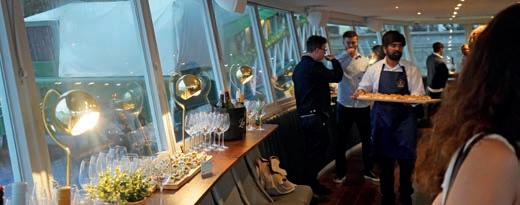
Alumni matriculating in the past decade congregated in September for the now biannual Young Alumni Drinks, which this year took place on the bridge of the Tattershall Castle – a permanently moored vessel on the Thames Embankment.
We were pleased to host alumni matriculating in 2000 & 2001 for their 25th Anniversary Reunion Dinner in spring.
This year, we will be moving the newly reintroduced 10th anniversary reunion to Cripps Hall, to accommodate our growing alumni community.
Please see here a list of the matriculation years invited back for reunion events in 2026:
40th Reunion (1986 & 1987) – Sunday 1st February
30th Reunion (1996 & 1997) – Friday 6th March
10th Reunion (2016 & 2017) – Friday 3rd July
60th Lunch (1966 & Before) – Wednesday 21st October
Benefactors’ Feast
In April the College hosted its major benefactors for the annual Ceremony of Benefactors and Benefactors’ Feast.

Dr Mohamed El-Erian gave the address during the Ceremony, reflecting upon the transformative impact of philanthropy on the College. Dr El-Erian listed the improvements made possible through donations, from infrastructure to teaching support, and wellbeing to decarbonisation. He emphasised that this support lays the foundation for students to aspire to the heights of alumni such as Sir Demis Hassabis (1994), our first Nobel Laureate, and maintains this nurturing community for generations to come.
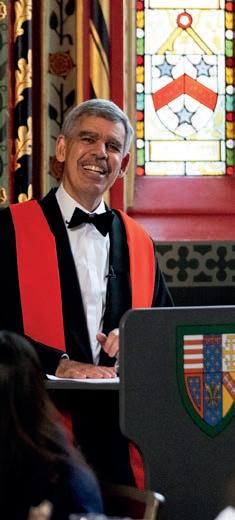
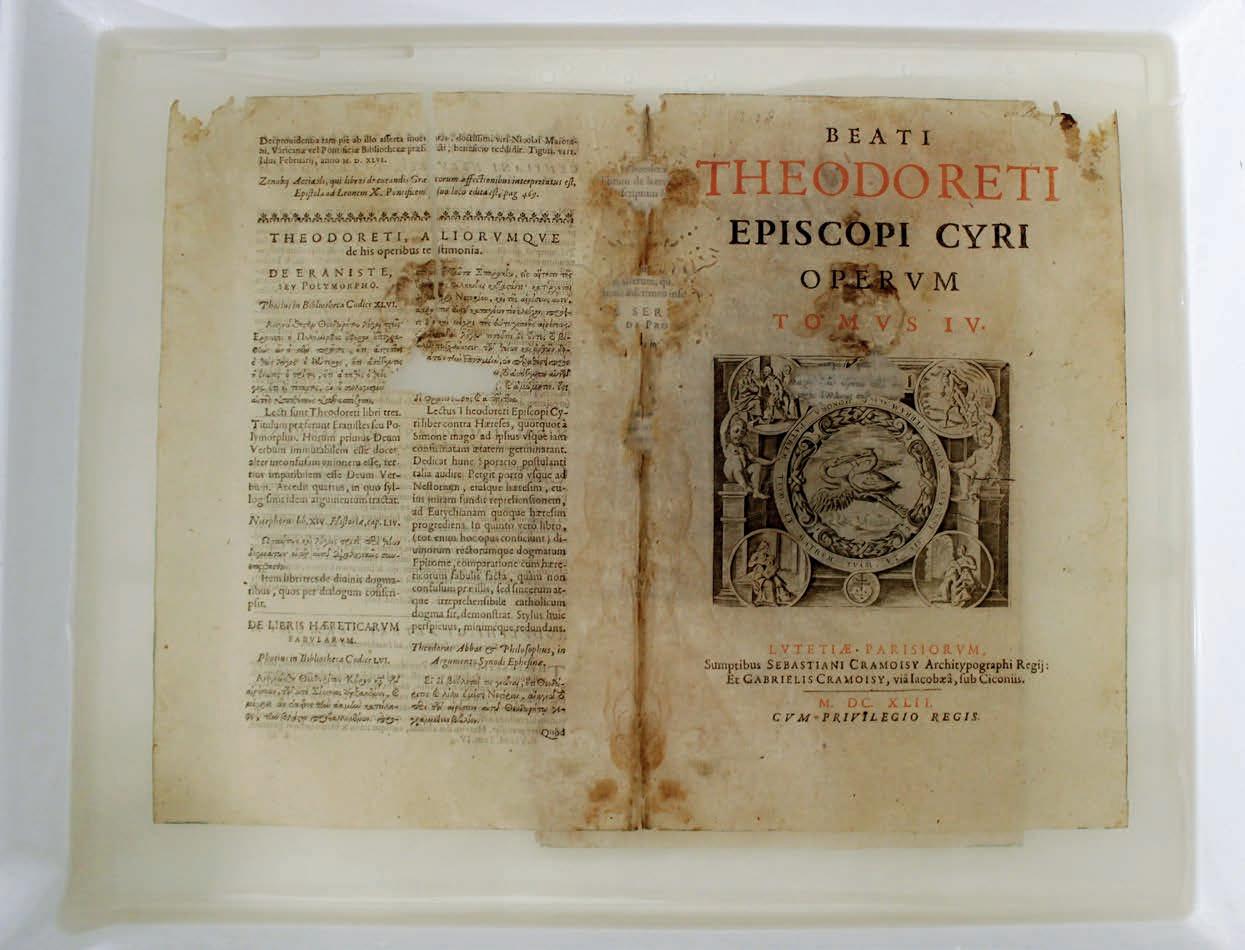
Title page of Beati Theodoreti Episcopi Cyri Operum (Paris, 1642) undergoing cleaning treatment in water bath (CCCC)
As many will know, the College’s special collections are both outstanding and extensive. In addition to the core collection of Early Modern printed books and Medieval manuscripts housed in the Old Library, the College also holds significant archival and early print collections in the Grange Road Store, Munro Room, Armitage Room, as well as other locations in College and elsewhere. In addition to always seeking new ways to realise the enormous value of our collections in teaching, learning and research, we take seriously our responsibility to curate and preserve these unique artefacts for posterity.
Much of our conservation work is undertaken by experts at the Cambridge Colleges Conservation Consortium (CCCC), to which the college pays an annual subscription. Due to the sheer volume of work, we also benefit greatly from the assistance of local specialist bookbinders, in particular Mr Barry Brignell who undertakes conservation work on a weekly basis in the Old Library.
Recently, much of the work has entailed the re-backing of early printed books, together with associated re-lettering, repair of torn papers, and other necessary restoration. We have also, for example, been able to restore and re-box Medieval and Early Modern manuscript volumes as a necessary component of our ongoing project to publish a catalogue of our entire manuscript collection (to be published next year). I am particularly pleased to have been able to use donations from alumni to restore items from our huge ‘Oriental Collection’. This very important collection of books and manuscripts, donated mainly by former Queens’ members of the past four hundred years, reflects the College’s specialisms in Hebrew and other non-western languages during that time. Sadly, the collection has suffered neglect over past decades, but we are now in the process of restoring as much of it as we possibly can. Likewise, we are particularly keen to restore the College’s very fine reserve collection of late eighteenth- and nineteenth-century books, some of which are in very poor condition, having been seen as a relatively low priority in previous decades. In addition, we must
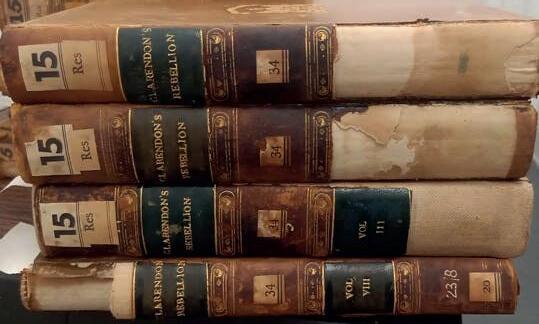
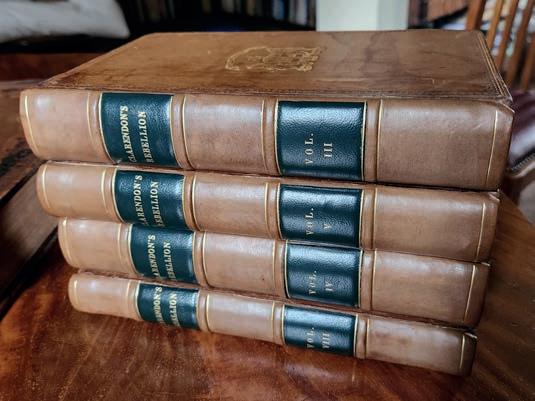
Before (top) and after (above). Conserved and rebacked by Barry
“ We are immensely grateful to all our supporters, and we look forward to further conservation success in future.”
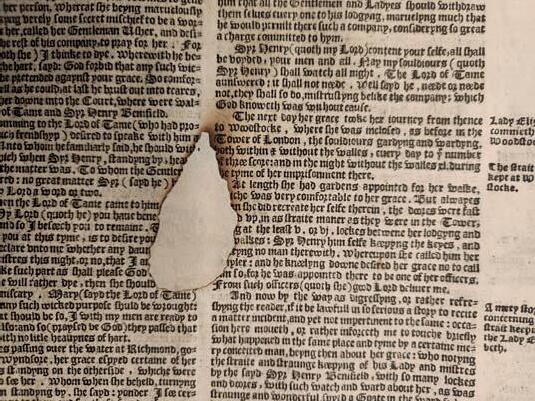
of course press ahead with our underlying conservation mission, which is to preserve our internationally important collection of early printed books and manuscripts in the Old Library.
Although the task might seem limitless, we are at present making significant inroads into the backlog of items requiring conservation, especially in those areas of the collection that have suffered neglect in previous decades. Whilst the College generously supports our conservation work, it is due to additional support from donors that we have in recent years been able to make up ground in areas of the collection that have sometimes suffered neglect. We are immensely grateful to all our supporters, and we look forward to further conservation success in future.
The Library holds regular exhibitions throughout the year, which alumni are always most welcome to visit. Upcoming events are added to our dedicated Library website.
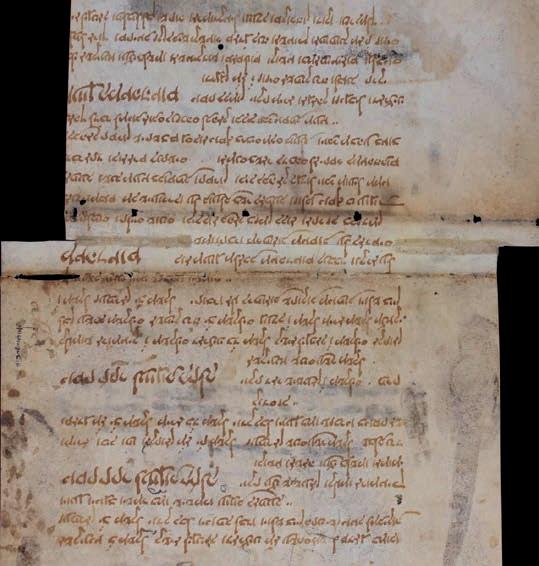
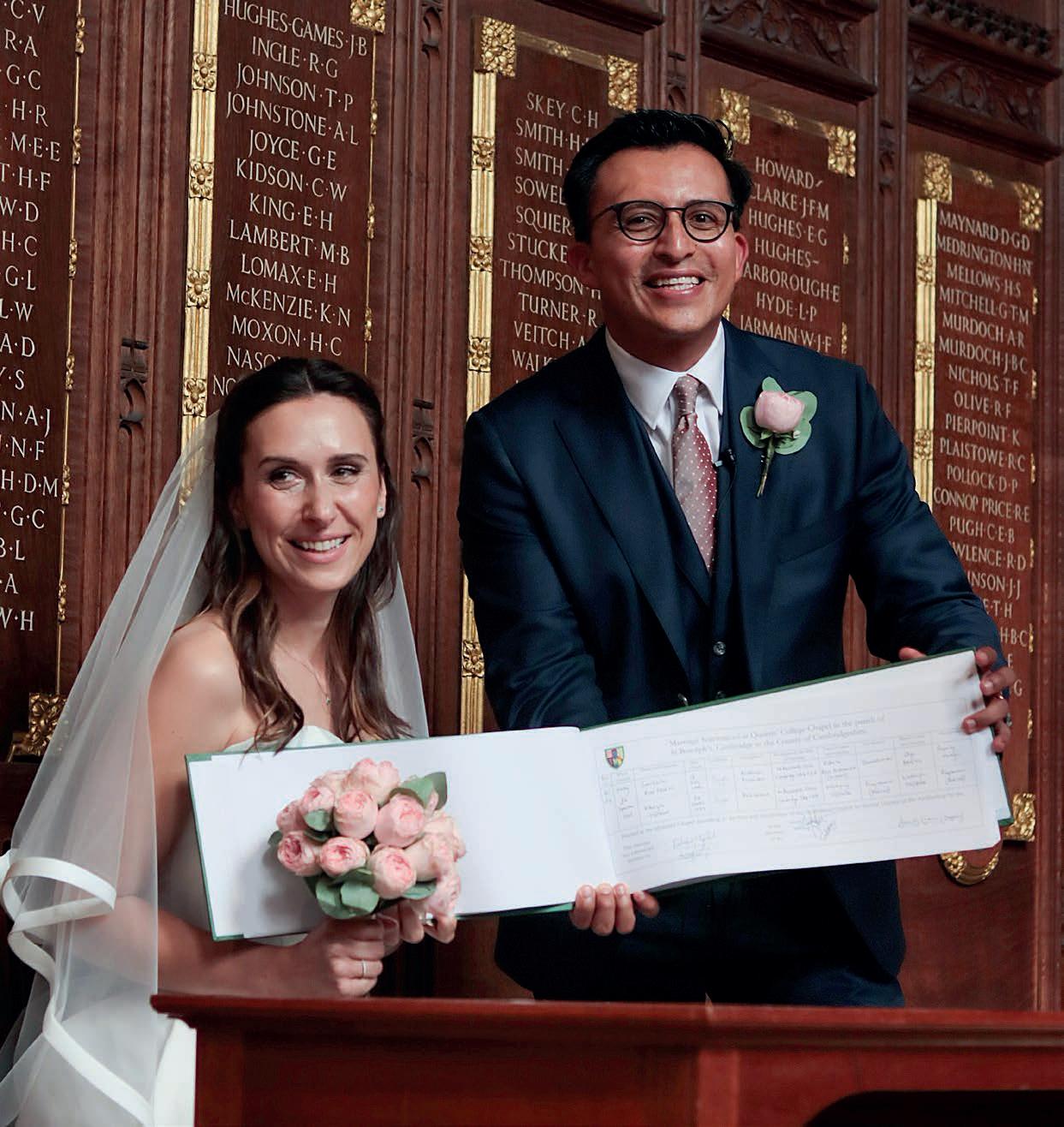
The Bridge: produced by the Alumni & Development Office at Queens’ thebridge@queens.cam.ac.uk
Alumni & Development Office
T7 Fisher Building
Queens’ College
Cambridge
CB3 9ET
Follow us on Facebook: QueensCollegeCambridge
Follow us on X: QueensAlumni
Follow us on LinkedIn: Queens’ College Alumni Office
Follow us on Instagram: @queens.alumni
The Queens’ College of Saint Margaret and Saint Bernard in the University of Cambridge is registered with The Charity Commission for England and Wales, number 1137495.
Find out more about the latest alumni events at Queens’ being held throughout the year: